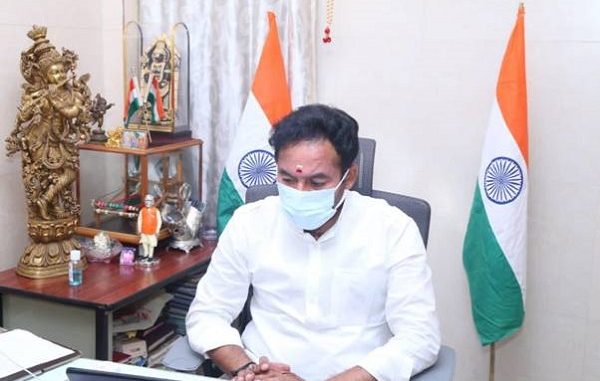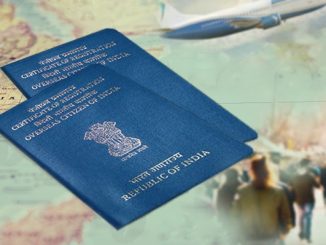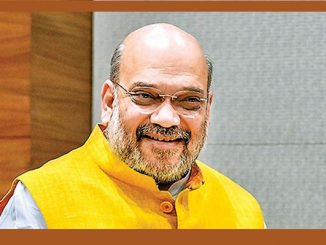
Dec 14: The Union Minister of State for Home Affairs, Shri G. Kishan Reddy has said that integrated database concepts like the CCTNS and ICJS have become indispensable to realize the dream of New India. He was addressing the inaugural session of the 2ndConference on ‘Good Practices in Crime and Criminal Tracking Network & Systems (CCTNS)/ Interoperable Criminal Justice System (ICJS) through video conferencing today. The two-day conference has been organized by the National Crime Records Bureau (NCRB).
Shri Reddy said that the two key modernization programmes of the Union Ministry of Home Affairs (MHA) have led to effective law enforcement and proved to be force multipliers.
“It is a reality that crime does not follow jurisdictional boundaries. Hence, our response to crime should also not be restricted by boundaries. Immediate recording of crime and the access of the information to all stakeholders is undoubtedly a key aspect of any effective law enforcement operation. This has led to the genesis of the project of CCTNS,” Shri Reddy said.
“This about Rs. 2000 crore, Mission mode project has revolutionized investigation and policing with its massive reach and connectivity. It has managed to connect the police stations and other offices, even in the most far-flung areas,” he added.
Shri Reddy said the ICJS takes data sharing to a higher level and ensures a single source of truth between law enforcement and judicial systems. “The operational efficiency of the criminal justice system, without doubt, ICJS is a force multiplier in this data driven world.”
Shri Reddy said the Prime Minister has stated that the New India needs to be a combination of ancient wisdom and modern technology. “The Union Government, under the visionary leadership of Prime Minister Shri Narendra Modi Ji, clubbed with valuable guidance and committed efforts of Home Minister Shri Amit Shah Ji, has taken several path breaking steps to modernize the criminal justice system.”
The Minister said that out of the total of 16,098 Police Stations in the country,CCTNS Software is being used in over 95 percent Police Stations, Connectivity is available at 97 percent Police Stations and 93 percent Police Stations are entering 100 percent FIRs through CCTNS.
Shri Reddy said, under the Prime Minister’s vision of SMART Policing, a new vision has emerged of maintaining law and order with focus on accountability, transparency, community-based strategies and efficiency. The two new Universities, Rashtriya Raksha University and the National Forensic Science University have been instituted with the vision to promote an objective and scientific approach in the criminal justice system. At the same time, under Assistance to States for Modernisation of Police, funds are provided for acquisition of latest weaponry, training gadgets, advanced communication and forensic equipment etc. including IT systems.
“A significant step towards enhancing the ease of living and community wellbeing has been the “Digital Police Portal” launched by MHA in 2018. Connecting all CCTNS based services as well as different Apps for police are available on this single central portal. Applications like CriMAC, Unify, NDSO, ITSSO, Central Citizen Services are worth mentioning in this regard,” he said.
Lauding the NCRB for implementation and effective monitoring of the revolutionary latest project, Shri Reddy said that these figures are impressive and reflect the hard work put in by every stakeholder for making CCTNS a success.
The Minister called for replicating the good initiatives taken by one State in other States. “It is a matter of great privilege that under the leadership of Prime Minister Shri Narendra Modiji, the Government has used cooperative federalism as a guiding mantra, states work together, learn together and propel each other forward,” he said.
Shri Reddy also commended the NCRB for putting together best practices in the form of a compendium. “It will prove to be a treasure of ideas for the law enforcement officers and ensure that the states can learn from each other.”
Speaking on the occasion, Director, NCRB, Shri Ram Phal Pawar said the NCRB is now implementing an ambitious project namely National Automated Finger Print Identification System (NAFIS) to automate the collection, storage and matching of fingerprints for expeditious identification of suspects. “This will also provide a much needed unique identifier for every arrested person in the CCTNS database as NAFIS and CCTNS are connected at the backend,” he said.
Presenting an overview of the NCRB activities, Shri Pawar said the updated version of CCTNS (State) application has been released to Haryana and Chhattisgarh on pilot basis before releasing to all other States. Further, NCRB is also coordinating with States/Union Territories (UTs) and NIC for the implementation of ICJS.
“As per latest reports, CCTNS data is being consumed electronically in courts in 28 States/UTs and in prisons in 32 States/UTs. Reverse transfer of court data into CCTNS has also started in 9 States/UTs,” he said.
Shri Pawar also said the States /UTs have also developed a number of mobile apps for police officers and citizens. These apps and tools developed by States do indicate that the PoliceForces are shifting rapidly on technology enabled platforms, utilizing CCTNS database.
On the occasion, Officers were felicitated for their efforts towards better implementation of CCTNS in their respective States.
Disclaimer: We donot claim that the images used as part of the news published are always owned by us. From time to time, we use images sourced as part of news or any related images or representations. Kindly take a look at our image usage policy on how we select the image that are used as part of the news.


